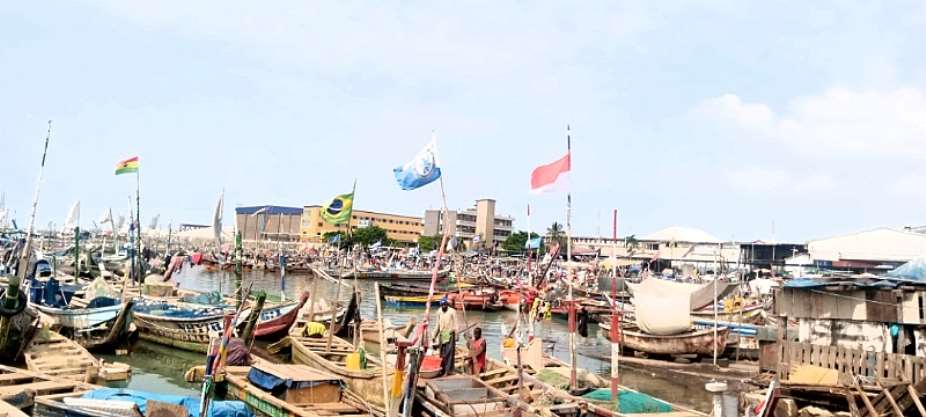Tema, June 11, CDA Consult – The blue economy feeds about 3.7 million people globally, Ghana must take full advantage of the potential to create more jobs along the value chain, Nii Ashitey Odamtey II, Tema Chief Fisherman has stated.
On top of the traditional ocean activities such as fisheries, tourism, and maritime transport, the blue economy entails emerging industries including renewable energy, aquaculture, seabed extractive activities, and marine biotechnology, and bioprospecting.
The Tema Chief Fisherman, therefore, called on fishermen and Ghanaians to adopt positive attitudes that would help preserve and conserve the ocean for future generations, “if we cannot protect the ocean, then we are doing great harm to ourselves”.
Nii Odamtey II stated during a beach cleanup exercise organized by Pioneering Food Cannery (PFC) monitored by the Communication for Development and Advocacy Consult (CDA Consult) in Tema.
According to the United Nations Department of Economic and Social Affairs document, “The blue economy, also known as the sustainable ocean-based economy, comprises a range of economic sectors and related policies that aims to foster economic and social progress while maintaining the health of our oceans and coasts.
For instance, the ocean food sector provides up to 237 million jobs globally and provides key nutrients and protein to over 3 billion people. In fact, food from the sea is the primary source of protein to over 50 per cent of the population in least developed countries.
Coastal and marine ecosystems contribute up to 11.5 billion USD to global tourism, while also protecting our coasts from storms and floods, providing habitat for biodiversity, carbon storage, and detoxification.
In terms of the global economy, around 90 per cent of all internationally traded goods are shipped by sea, and the market value of marine and coastal resources and industries is estimated at US$3 trillion per year or about 5 per cent of global gross domestic product. Sustainable use of ocean, seas and marine resources, as set out in SDG14, lies at the center of a sustainable blue economy, though common principles are yet to be determined.”
Therefore, Tema Chief Fisherman indicated that the preservation of marine life did not only have to do with replacing the fish population but also mitigating human activities such as pollution, habitat destructions, overfishing, and a lot more.
Nii Odamtey II explained that aquatic lives would be lost due to indiscriminate human activities on land including the disposal of plastic waste into the ocean.
He said the ocean had been the major source of income, solving unemployment problems, oxygen among others, and any activity that would lead to the destruction of the ocean must be abolished.
He explained that ocean reservation is key in resisting global climate challenges, stressing it is one of the environmental concerns affecting the world at large adding that the injury of the ocean is also damage to animal protein essential to human health, loss of jobs linked to the oceans, and others.
“When it rains and you stand around the Chemu Lagoon, you will see the lagoon carrying a lot of plastics into the sea,” he said.
He called on the stakeholders to provide all the necessary tools for the implementation of the Operation Clean your Frontage initiative to reduce the rate at which people deposited industrial and domestic waste into water bodies.






 Supreme Court clears way for dual citizens to hold key public positions
Supreme Court clears way for dual citizens to hold key public positions
 Be transparent, don’t suppress the truth – Prof. Opoku-Agyemang to Jean Mensa
Be transparent, don’t suppress the truth – Prof. Opoku-Agyemang to Jean Mensa
 ‘I won’t tell the world I was only a driver’s mate during challenges’ – Prof Jan...
‘I won’t tell the world I was only a driver’s mate during challenges’ – Prof Jan...
 We’ll prosecute corrupt officials of Akufo-Addo’s govt – Prof Jane Naana
We’ll prosecute corrupt officials of Akufo-Addo’s govt – Prof Jane Naana
 [Full text] Acceptance speech by Prof Jane Naana Opoku-Agyemang as 2024 NDC Runn...
[Full text] Acceptance speech by Prof Jane Naana Opoku-Agyemang as 2024 NDC Runn...
 Election 2024: Don’t be complacent, we haven’t won yet – Asiedu Nketia cautions ...
Election 2024: Don’t be complacent, we haven’t won yet – Asiedu Nketia cautions ...
 Election 2024: Stop fighting over positions in Mahama’s next govt – Asiedu Nketi...
Election 2024: Stop fighting over positions in Mahama’s next govt – Asiedu Nketi...
 Prof Jane Naana Opoku-Agyemang will restore dignity of vice presidency – Fifi Kw...
Prof Jane Naana Opoku-Agyemang will restore dignity of vice presidency – Fifi Kw...
 'Ghana beyond aid' has turned out to be 'Ghana without compass' – Naana Opoku-Ag...
'Ghana beyond aid' has turned out to be 'Ghana without compass' – Naana Opoku-Ag...
 Nation builder Mahama will deliver on his promise of a 24-hour economy for the b...
Nation builder Mahama will deliver on his promise of a 24-hour economy for the b...
